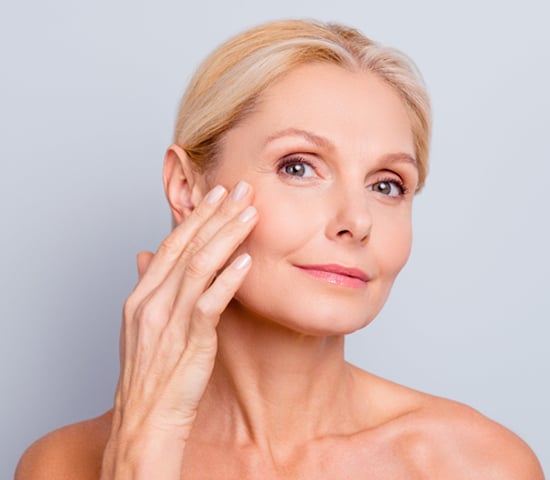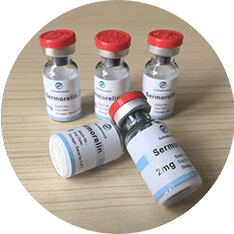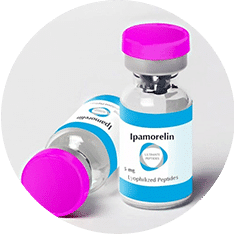
Unlock a More Youthful You With Hormone Replacemment Therapy In Millburn, NJ
Aging is inevitable, and for many, it signals the beginning of a new chapter - one where you cross off bucket list items and live life to the fullest, on your own terms. However, for some women, aging is a horrible prospect, filled with chronic fatigue, irritability, and inability to perform in the bedroom. If you're concerned about life in middle age and beyond, we've got great news: there are easy, proven steps that you can take to help stop the negative effect of aging.
Global Life Rejuvenation was founded to give women a new lease on life - one that includes less body fat, fewer mood swings, and more energy as you age. If you're ready to look and feel younger, it's time to consider HRT (hormone replacement therapy), and growth hormone peptides. These therapies for men and women are effective, safe, and customized to fit your goals, so you can keep loving life as you get older.
HRT, and growth hormone peptide therapies bridge the gap between your old life and the more vibrant, happier version of you. With a simple click or call, you can be well on your way to a brighter future. After all, you deserve to be the one in charge of your wellness and health. Now, you have the tools to do so - backed by science and applied by our team of HRT experts with more than 13 years of experience.
What is HRT?
As women age, their hormones begin to go through changes that affect their day-to-day lives. For women, hormone deficiency and imbalance usually occur during menopause and can cause chronic fatigue, hot flashes, and mood swings, among other issues. Hormone replacement therapy helps correct hormone imbalances in women, helping them feel more vibrant and virile as they age.
Often, HRT treatments give patients enhanced quality of life that they didn't think was possible - even in their 60's and beyond.
The benefits for women are numerous and are available today through Global Life Rejuvenation.
HORMONE REPLACEMENT THERAPY
HRT and Anti-Aging Medicine for Women in Millburn, NJ
As women age, their bodies begin to go through significant changes that affect their quality of life. This change is called menopause and marks the end of a woman's menstrual cycle and reproduction ability. Though there is no specific age when this change occurs, the average age of menopause onset is 51 years old. However, according to doctors, menopause officially starts 12 months after a woman's final period. During the transition to menopause, women's estrogen and other hormones begin to deplete.
As that happens, many women experience severe symptoms. These symptoms include:
- Hot Flashes
- Chronic Fatigue
- Incontinence
- Trouble Sleeping
- Dryness
- Muscle Loss
- Fat Gain
- Mood Swings
The symptoms of hormone deficiency can be concerning and scary for both women and their spouses. However, if you're getting older and notice some of these symptoms, there is reason to be hopeful. Hormone replacement therapy and anti-aging medicine for women can correct imbalances that happen during menopause. These safe, effective treatments leave you feeling younger, healthier, and more vibrant.


What Causes Menopause?
The most common reason for menopause is the natural decline in a female's reproductive hormones. However, menopause can also result from the following situations:
Oophorectomy: This surgery, which removes a woman's ovaries, causes immediate menopause. Symptoms and signs of menopause in this situation can be severe, as the hormonal changes happen abruptly.
Chemotherapy: Cancer treatments like chemotherapy can induce menopause quickly, causing symptoms to appear shortly after or even during treatment.
Ovarian Insufficiency: Also called premature ovarian failure, this condition is essentially premature menopause. It happens when a woman's ovaries quit functioning before the age of 40 and can stem from genetic factors and disease. Only 1% of women suffer from premature menopause, but HRT can help protect the heart, brain, and bones.
Common Issues for Women During Menopause
For many women, menopause is a trying time that can be filled with many hormonal hurdles to jump through. A little knowledge can go a long way, whether you're going through menopause now or are approaching "that" age.
Here are some of the most common issues that women experience during menopause:

Depression
If you're a woman going through menopause and find that you have become increasingly depressed, you're not alone. It's estimated that 15% of women experience depression to some degree while going through menopause. What many women don't know is that depression can start during perimenopause, or the years leading up to menopause.
Depression can be hard to diagnose, especially during perimenopause and menopause. However, if you notice the following signs, it might be time to speak with a physician:
- Mood Swings
- Inappropriate Guilt
- Chronic Fatigue
- Too Much or Too Little Sleep
- Lack of Interest in Life
- Overwhelming Feelings
Remember, if you're experiencing depression, you're not weak or broken - you're going through a very regular emotional experience. The good news is that with proper treatment from your doctor, depression isn't a death sentence. And with HRT and anti-aging treatment for women, depression could be the catalyst you need to enjoy a new lease on life.

Hot Flashes
Hot flashes - they're one of the most well-known symptoms of menopause. Hot flashes are intense, sudden feelings of heat across a woman's upper body. Some last second, while others last minutes, making them incredibly inconvenient and uncomfortable for most women.
Symptoms of hot flashes include:
- Sudden, Overwhelming Feeling of Heat
- Anxiety
- High Heart Rate
- Headache
- Nausea
- Dizziness
Typically, hot flashes are caused by a lack of estrogen. Low estrogen levels negatively affect a woman's hypothalamus, the part of the brain that controls body temperature and appetite. Low estrogen levels cause the hypothalamus to incorrectly assume the body is too hot, dilating blood vessels to increase blood flow. Luckily, most women don't have to settle for the uncomfortable feelings that hot flashes cause. HRT treatments for women often stabilize hormones, lessening the effects of hot flashes and menopause in general.

Mood Swings
Mood swings are common occurrences for most people - quick shifts from happy to angry and back again, triggered by a specific event. And while many people experience mood swings, they are particularly common for women going through menopause. That's because, during menopause, the female's hormones are often imbalanced. Hormone imbalances and mood swings go hand-in-hand, resulting in frequent mood changes and even symptoms like insomnia.
The rate of production of estrogen, a hormone that fluctuates during menopause, largely determines the rate of production the hormone serotonin, which regulates mood, causing mood swings.
Luckily, HRT and anti-aging treatments in Millburn, NJ for women work wonders for mood swings by regulating hormone levels like estrogen. With normal hormone levels, women around the world are now learning that they don't have to settle for mood swings during menopause.

Weight Gain
Staying fit and healthy is hard for anyone living in modern America. However, for women with hormone imbalances during perimenopause or menopause, weight gain is even more serious. Luckily, HRT treatments for women coupled with a physician-led diet can help keep weight in check. But which hormones need to be regulated?
- Estrogen: During menopause, estrogen levels are depleted. As such, the body must search for other sources of estrogen. Because estrogen is stored in fat, your body believes it should increase fat production during menopause. Estrogen also plays a big part in insulin resistance, which can make it even harder to lose weight and keep it off.
- Progesterone: Progesterone levels are also depleted during menopause. Progesterone depletion causes bloating and water retention, while loss of testosterone limits the body's ability to burn calories.
- Ongoing Stress: Stress makes our bodies think that food is hard to come by, putting our bodies in "survival mode". When this happens, cortisol production is altered. When cortisol timing changes, the energy in the bloodstream is diverted toward making fat. With chronic stress, this process repeatedly happens, causing extensive weight gain during menopause.

Low Libido
Lowered sexual desire - three words most men and women hate to hear. Unfortunately, for many women in perimenopausal and menopausal states, it's just a reality of life. Thankfully, today, HRT and anti-aging treatments Millburn, NJ can help women maintain a normal, healthy sex drive. But what causes low libido in women, especially as they get older?
The hormones responsible for low libido in women are progesterone, estrogen, and testosterone.
Progesterone production decreases during perimenopause, causing low sex drive in women. Lower progesterone production can also cause chronic fatigue, weight gain, and other symptoms. On the other hand, lower estrogen levels during menopause lead to vaginal dryness and even vaginal atrophy or loss of muscle tension.
Lastly, testosterone plays a role in lowered libido. And while testosterone is often grouped as a male hormone, it contributes to important health and regulatory functionality in women. A woman's testosterone serves to heighten sexual responses and enhances orgasms. When the ovaries are unable to produce sufficient levels of testosterone, it often results in a lowered sex drive.

Vaginal Dryness
Often uncomfortable and even painful, vaginal dryness is a serious problem for sexually active women. However, like hair loss in males, vaginal dryness is very common - almost 50% of women suffer from it during menopause.
Getting older is just a part of life, but that doesn't mean you have to settle for the side effects. HRT and anti-aging treatments for women correct vaginal dryness by re-balancing estrogen, progesterone, and testosterone. When supplemented with diet and healthy living, your vagina's secretions are normalized, causing discomfort to recede.

Fibroids
Uterine fibroids - they're perhaps the least-known symptom of menopause and hormone imbalances in women. That's because these growths on the uterus are often symptom-free. Unfortunately, these growths can be cancerous, presenting a danger for women as they age.
Many women will have fibroids at some point. Because they're symptomless, they're usually found during routine doctor exams. Some women only get one or two, while others may have large clusters of fibroids. Because fibroids are usually caused by hormone imbalances, hysterectomies have been used as a solution, forcing women into early menopause.
Advances in HRT and anti-aging medicine for women give females a safer, non-surgical option without having to experience menopause early. At Global Life Rejuvenation, our expert physicians will implement a customized HRT program to stabilize your hormones and reduce the risk of cancerous fibroid growth.

Endometriosis
Endometriosis symptoms are much like the effects of PMS, and include pelvic pain, fatigue, cramping, and bloating. While doctors aren't entirely sure what causes this painful, uncomfortable condition, most agree that hormones - particularly xenoestrogens - play a factor.
Endometriosis symptoms are much like the effects of PMS and include pelvic pain, fatigue, cramping, and bloating. While doctors aren't entirely sure what causes this painful, uncomfortable condition, most agree that hormones - particularly xenoestrogens - play a factor.
Xenoestrogen is a hormone that is very similar to estrogen. Too much xenoestrogen is thought to stimulate endometrial tissue growth. HRT for women helps balance these hormones and, when used with a custom nutrition program, can provide relief for women across the U.S.
Is HRT for Women the Right Answer?
Hormone stability is imperative for a healthy sex drive and for a normal, stress-free life during menopause. HRT and anti-aging treatments for women balance the hormones that your body has altered due to perimenopause or menopause.
HRT for women is a revolutionary step in helping women live their best lives, even as they grow older. However, at Global Life Rejuvenation, we know that no two patients are the same. That's why we specialize in holistic treatments that utilize HRT, combined with healthy nutrition, supplements, and fitness plans that maximize hormone replacement treatments.
If you've been suffering through menopause, is HRT the answer? That's hard to say without an examination by a trusted physician, but one thing's for sure. When a woman balances her hormone levels, she has a much better shot at living a regular life with limited depression, weight gain, mood swings, and hot flashes.
Here are just a few additional benefits of HRT and anti-aging treatments for females:


Benefits of HRT and Anti-Aging Medicine for Women in Millburn, NJ
Hormone imbalance causes a litany of issues. But with anti-aging treatments for women, females can better process calcium, keep their cholesterol levels safe, and maintain a healthy vagina. By replenishing the body's estrogen supply, HRT can relieve symptoms from menopause and protect against osteoporosis. But that's just the start.
Global Life Rejuvenation's patients report many more benefits of HRT and anti-aging medicine for women:
- Fewer Mood Swings
- Thicker Hair
- Stronger Bones
- Less Body Fat
- More Energy
- More Stamina
- Increased Sex Drive and Pleasure Sensations
- Better Cognitive Functions
- Improved Pain Receptors
- Less Hot Flashes and Night Sweats
- Lower Triglycerides
- Fewer Bladder Infections
If you're ready to feel better, look better, and recapture the vitality of your youth, it's time to contact Global Life Rejuvenation. It all starts with an in-depth consultation, where we will determine if HRT and anti-aging treatments for women are right for you. After all, every patient's body and hormone levels are different. Since all our treatment options are personalized, we do not have a single threshold for treatment. Instead, we look at our patient's hormone levels and analyze them on a case-by-case basis.

HRT from Global Life Rejuvenation
At Global Life Rejuvenation, we help women rediscover their youth with HRT treatment for women. We like to think of ourselves as an anti-aging concierge service, guiding and connecting our patients to the most qualified HRT physicians available. With customized HRT treatment plan for women, our patients experience fewer menopausal symptoms, less perimenopause & menopause depression, and often enjoy a more youth-like appearance.
Reverse Aging with Growth Hormone Peptides
Growth hormone peptides are an innovative therapy that boosts the natural human growth hormone production in a person's body. These exciting treatment options help slow down the aging process and give you a chance at restoring your youth.

What is Sermorelin?
Sermorelin is a synthetic hormone peptide, like GHRH, which triggers the release of growth hormones. When used under the care of a qualified physician, Sermorelin can help you lose weight, increase your energy levels, and help you feel much younger.

Benefits of Sermorelin
Human growth hormone (HGH) therapy has been used for years to treat hormone deficiencies. Unlike HGH, which directly replaces declining human growth hormone levels, Sermorelin addresses the underlying cause of decreased HGH, stimulating the pituitary gland naturally. This approach keeps the mechanisms of growth hormone production active.
- Benefits of Sermorelin include:
- Better Immune Function
- Improved Physical Performance
- More Growth Hormone Production
- Less Body Fat
- Build More Lean Muscle
- Better Sleep

What is Ipamorelin?
Ipamorelin helps to release growth hormones in a person's body by mimicking a peptide called ghrelin. Ghrelin is one of three hormones which work together to regulate the growth hormone levels released by the pituitary gland. Because Ipamorelin stimulates the body to produce growth hormone, your body won't stop its natural growth hormone production, which occurs with synthetic HGH.
Ipamorelin causes growth hormone secretion that resembles natural release patterns rather than being constantly elevated from HGH. Because ipamorelin stimulates the natural production of growth hormone, our patients can use this treatment long-term with fewer health risks.

Benefits of Ipamorelin
One of the biggest benefits of Ipamorelin is that it provides significant short and long-term benefits in age management therapies. Ipamorelin can boost a patient's overall health, wellbeing, and outlook on life.
When there is an increased concentration of growth hormone by the pituitary gland, there are positive benefits to the body. Some benefits include:
- Powerful Anti-Aging Properties
- More Muscle Mass
- Less Unsightly Body Fat
- Deep, Restful Sleep
- Increased Athletic Performance
- More Energy
- Less Recovery Time for Training Sessions and Injuries
- Enhanced Overall Wellness and Health
- No Significant Increase in Cortisol
Your New, Youthful Lease on Life with HRT for Women
Whether you are considering our HRT and anti-aging treatments for women in Millburn, NJ, we are here to help. The first step to reclaiming your life begins by contacting Global Life Rejuvenation. Our friendly, knowledgeable HRT experts can help answer your questions and walk you through our procedures. From there, we'll figure out which treatments are right for you. Before you know it, you'll be well on your way to looking and feeling better than you have in years!
 866-793-9933
866-793-9933
Request a Consultation
Latest News in Millburn, NJ
Watch MHS Boys Lacrosse Team Play Essex County Tournament Sat, May 4 at CHS
TAPintohttps://www.tapinto.net/towns/millburn-slash-short-hills/sections/sports/articles/watch-mhs-boys-lacrosse-team-play-essex-county-tournament-sat-may-4-at-chs
MAPLEWOOD, NJ -- The Millburn High School Boys Lacrosse team kicks off the Essex County tournament this Saturday, May 4 at 4 p.m. as they travel to Columbia High School. According to team member parent David Lipton, "The Millers seek to avenge a tough 8-7 overtime loss to their rival a month earlier. Millburn’s 8-3 record is a sharp improvement from last year’s .500 finish, but it comes as no surprise." He explained that the team returned to most of its starters, including a strong core of seniors who have played togeth...
MAPLEWOOD, NJ -- The Millburn High School Boys Lacrosse team kicks off the Essex County tournament this Saturday, May 4 at 4 p.m. as they travel to Columbia High School. According to team member parent David Lipton, "The Millers seek to avenge a tough 8-7 overtime loss to their rival a month earlier. Millburn’s 8-3 record is a sharp improvement from last year’s .500 finish, but it comes as no surprise." He explained that the team returned to most of its starters, including a strong core of seniors who have played together for years with strong bonds both on and off the field.
The team is led by senior captains, Quentin Kuehn (Ursinus commit) and Zach Lipton (RIT commit) and Logan Barr. They are joined by fellow seniors and multi-year varsity letter man Jesse Schwartz, (a middie who paces the team with 25 assists), versatile attack/middie Jake Fishkin, LSM Dylan Wolk, goalie Bobby Hanson and Andrew Zeballos (attack).
Other team leaders include junior Ander Berman, among the state leaders in face-offs wins this season (149) while chipping in 31 points, sophomore Ollie Becker-who leads the team in scoring (28 goals, 42 points) after a brilliant freshman year, and Wade Schmell who has anchored the defense with stand out play all season.
Sign Up for FREE Millburn/Short Hills Newsletter
Get local news you can trust in your inbox.
Rounding out the defense are d-middies led by senior Logan Barr, sophomores Chase Plotkin and Ethan Weinberg.
Other players who have contributed in a big way, include freshman middy Chace Redler (18 points), who makes an impact on both sides of the ball, and freshman defenseman Jagger Zemachson who is among the team leaders in ground balls and forced turnovers.
Another team member's father, Gregg Berman, shared, "Millburn has faced its share of injuries this year. Zach Lipton, the team’s leading scorer for each of the past two seasons, had off-season knee surgery and has had a limited role to start the year. But injuries and line-up changes have created opportunities for more players to contribute, including junior Kiefer Curi and freshmen Quinn Barkley and Timmy Hansen who have added timely goals to Millburn’s attack." He noted that sophomore Wes Dieckman has stepped into a starting role on a defense that has been bolstered by juniors Evan Abraham and Jared Barishaw and sophomores Will Dieterich and Miles Welner.
The players invite everyone to support and cheer on the team this Saturday, May 4, at 4:00 p.m. at Colombia High School.
Hartshorn Elementary School Chess Club Teams Make History at NJSCF Grade School Championships
TAPintohttps://www.tapinto.net/towns/millburn-slash-short-hills/categories/press-releases/articles/hartshorn-elementary-school-chess-club-teams-make-history-at-njscf-grade-school-championships
Hartshorn Elementary School Chess Award Group picture at Tournament Brookdale Community College.Photo Credit: Ying Gu, Cindy Chen, Pooja Batra, Harinder KauHartshorn Elementary School Chess Award, Kindergarten.Photo Credit: Ying Gu, Cindy Chen, Pooja Batra, Harinder KauHartshorn Elementary School Chess Award, 1st grade.Photo Credit: Ying Gu, Cindy Chen, Pooja Batra, Harinder KauHartshorn Elementary School Chess Award, 2nd grade. Photo Credit: Ying Gu, Ci...
Hartshorn Elementary School Chess Award Group picture at Tournament Brookdale Community College.Photo Credit: Ying Gu, Cindy Chen, Pooja Batra, Harinder Kau
Hartshorn Elementary School Chess Award, Kindergarten.Photo Credit: Ying Gu, Cindy Chen, Pooja Batra, Harinder Kau
Hartshorn Elementary School Chess Award, 1st grade.Photo Credit: Ying Gu, Cindy Chen, Pooja Batra, Harinder Kau
Hartshorn Elementary School Chess Award, 2nd grade. Photo Credit: Ying Gu, Cindy Chen, Pooja Batra, Harinder Kau
Hartshorn Elementary School Chess Award, 3rd grade.Photo Credit: Ying Gu, Cindy Chen, Pooja Batra, Harinder Kau
Hartshorn Elementary School Chess Award, 4th grade.Photo Credit: Ying Gu, Cindy Chen, Pooja Batra, Harinder Kau
Photo Credit: Ying Gu, Cindy Chen, Pooja Batra, Harinder Kau
Photo Credit: Ying Gu, Cindy Chen, Pooja Batra, Harinder Kau
Hartshorn Elementary School Chess Award Group picture at Millburn High School. Photo Credit: Ying Gu, Cindy Chen, Pooja Batra, Harinder Kau
By Cindy Chen & Ying Gu, Special to TAPinto Millburn-Short Hills
MILLBURN, NJ - Hartshorn Elementary School (K-4) in Millburn/Short Hills achieved historic success at the New Jersey State Chess Federation (NJSCF) Grade School Championships on November 19, 2023.
With over 500 students from grades K-12 participating in the championship event statewide, the achievement of one or two teams receiving a trophy is commendable. However, the remarkable awards of all five grade levels scoring either 1st or 2nd place is unprecedented.
View the championship results here.
Sign Up for FREE Millburn/Short Hills Newsletter
Get local news you can trust in your inbox.
Kindergarten team: 1st place (Arjun, Nathan, Raghav)
1st-grade team: 2nd place (Hannah, Nikhil, Rian)
2nd-grade team: 1st place (Aarav, Christian, Juefei, Rhys, Rishi)
3rd-grade team: 2nd place (Himansh, Josh, Varun, Vincent, William)
4th-grade team: 2nd place (Aarav, Gracelyn, Ivory, Josh, Maahi, Nathan, Sheehan, Vincent)
"I'm exceptionally proud of these students for their hard work and dedication,” praised from Hartshorn Elementary School Principal Ken Frattini, the enthusiastic coach of Hartshorn Chess Club and the founder of Millburn/Short Hills interschool chess league.
"The school and parents have partnered to provide the opportunities and the platform to engage in chess, but the students have taken it upon themselves to excel.” said Principal Frattini, “Master Coach Massey and team organizers, parents Dr. Chen and Ms. Gu, deserve praise as well for their dedication and for providing an enriched environment where the children's minds and thinking are nourished."
Millburn flips middle finger to affordable housing | Editorial
Star-Ledger Editorialhttps://www.nj.com/opinion/2024/04/millburn-flips-middle-finger-to-affordable-housing-editorial.html
New Jersey is building more affordable housing than ever before, but for every home we build, there are still 14 prospective renters who need one. The daunting bottom line: The state faces an estimated shortage of at least 2...
New Jersey is building more affordable housing than ever before, but for every home we build, there are still 14 prospective renters who need one. The daunting bottom line: The state faces an estimated shortage of at least 230,000 homes, and the only thing that will change that grim arithmetic is to have all 600 cities and towns operate in good faith and build their quota in accordance with the Mount Laurel Doctrine.
Millburn apparently doesn’t agree, and doesn’t care that 1 out of 4 renters in our state pay more than half their income on housing, most often in poor neighborhoods with bad schools.
The posh township has refused to comply with the law, even as contiguous neighbors in suburban Essex County do their fair share. Towns like Livingston and West Orange have built hundreds of units and have plans for hundreds more, but Millburn has thumbed its nose at its constitutional requirement and dragged its feet through five years of litigation, building a grand total of 38 affordable units from an obligation that dates back to the 1990s.
That’s just a wee bit shy of its obligation to build 1,115, which is why the entire state should applaud Superior Court Judge Cynthia Santomauro, who recently told Millburn that its stalling and exclusionary tactics are no longer tolerable, and left it up to a special master to determine where it must build 75 affordable housing units.
The judge’s decision is the result of action taken by the Fair Share Housing Center, which is responsible for negotiating affordable housing settlements with individual towns. Since 2021, the nonprofit group has been trying to get Millburn to honor its agreement to build housing at a dilapidated DPW site off Main Street, between the business district and a railroad trestle.
But the town’s elected officials announced it would pull out of the project in February, so the judge – after dismissing Millburn’s alternate proposals as “an illusory promise” – dropped the hammer.
Santomauro told Millburn that it can watch the rest of this process from the sidelines, ordered the township to pay legal fees for the Fair Share Housing Center and the project developer, and instructed veteran special master Frank Banisch to also conduct an audit of the town’s Affordable Housing Trust Fund.
“We’re dealing with an exclusionary town,” said FSHC attorney Josh Bauers, who has handled the Millburn case since 2021. “It’s a town that has been zoned a particular way, and they’ve managed to get away without doing very much. It’s a town that needed to be sued to comply, because they felt they could get away with it.”
Nearly 50 years have passed since the New Jersey Supreme Court outlawed exclusionary zoning, which established that New Jersey towns couldn’t zone to keep poor people out by requiring each town to create a “realistic opportunity” to build its share of affordable housing.
Some towns like Millburn -- where the average home price is north of $1 million -- believe they can build walls on their borders under the rubric of “home rule,” which in some cases is a fair argument – at least when it comes to making civic decisions about parks and schools.
But refusing to build affordable housing, as mandated by law, drives up prices for everyone else and keeps low-income families confined to the cities.
Compare this with Saddle River, which has 3,300 residents and a median household income ($228,750) that is more than double the state average.
The opulent Bergen County community has bought into affordable housing with honorable intent and unexpected gusto: It broke ground last week on a 112-unit apartment complex for low- and moderate-income residents, with the mayor and council members all picking up shovels for the media event. And nobody was whingeing about home rule and an invasion of needy neighbors.
There may always be towns that maintain an exclusionary posture and need a legal and financial pummeling to comply with the law. Let Millburn heed a lesson that stings for a while.
U.S. Attorney weighs in on Orthodox Jewish group’s land use lawsuit in Millburn
Anthony G. Attrinohttps://www.nj.com/essex/2023/12/us-attorney-weighs-in-on-orthodox-jewish-groups-land-use-lawsuit-in-millburn.html
The U.S. Attorney for the District of New Jersey weighed in Monday on a long-standing legal feud between a township in Essex County and an Orthodox Jewish group, stating religious groups must not face legal barriers when establishing new houses of worship.Chai Center for Living Judaism has filed lawsuits in state and federal courts against the Township of Millburn, alleging they were discriminated against when ...
The U.S. Attorney for the District of New Jersey weighed in Monday on a long-standing legal feud between a township in Essex County and an Orthodox Jewish group, stating religious groups must not face legal barriers when establishing new houses of worship.
Chai Center for Living Judaism has filed lawsuits in state and federal courts against the Township of Millburn, alleging they were discriminated against when town officials denied applications to build a synagogue in Millburn.
The federal lawsuit, filed March 31 in U.S. District Court, alleges the township prevented Chai Center from engaging in Orthodox Jewish prayer by thwarting their efforts to build the house of worship on Millburn Avenue.
“Houses of Worship are permitted with conditional use approval,” the township stated in an answer to the federal lawsuit.
Millburn officials did not immediately respond on Tuesday to requests for comment on the U.S. Attorney’s court filing or on the various court actions that have taken place since 2009.
Attorneys for the Maryland law firm that filed the suit were not immediately available to comment.
“The defendants’ actions have prevented plaintiffs from engaging in their religious exercise by building their synagogue, which would allow Chai Center to provide and to expand its religious programming and free it from the onerous conditions under which it now operates out of its rabbi’s home,” the federal lawsuit states.
“The defendants’ actions have prevented plaintiffs from engaging in their religious exercise,” the suit states.
Building a synagogue would allow Chai Center to provide and expand religious programming, the suit says, noting the center currently operates of its rabbi’s home.
The lawsuit alleges parts of the township’s land-use regulations, such as its requirement that houses of worship be located on lots at least 3 acres in size, violates the federal Religious Land Use and Institutionalized Persons Act.
In response, Millburn filed a motion arguing the RLUIPA claims should be dismissed based on a standard used in state court to review zoning decisions. The motion also argues that the RLUIPA claims are not ready to be heard in federal court because the zoning denial was based on procedural grounds.
RLUIPA is a federal law designed to protect religious institutions from unduly burdensome or discriminatory land use regulations, according to the U.S. Attorney’s Office.
Ahead of a decision on the motion, the U.S. Attorney in New Jersey, along with the Justice Department’s Civil Rights Division, filed a statement of interest in the case on Monday.
“RLUIPA is designed to ensure that religious groups of all faiths do not face unjust barriers when seeking to establish places to worship,” said Assistant Attorney General Kristen Clarke of the Justice Department’s Civil Rights Division, said in a news release.
“Local land use boards cannot unfairly or discriminatorily deny a religious group’s application to use land for religious purposes,” Clarke said. “When local officials use the guise of zoning restrictions to block or restrict religious groups, this not only contravenes our nation’s commitment to religious freedom, it also violates federal law.”
Thank you for relying on us to provide the journalism you can trust. Please consider supporting NJ.com with a subscription.
Concerns Regarding Affordable Housing Legislation
TAPintohttps://www.tapinto.net/towns/millburn-slash-short-hills/sections/government/articles/concerns-regarding-affordable-housing-legislation
MILLBURN, NJ -- We have personal concerns related to Assembly Bill 4 (https://legiscan.com/NJ/bill/A4/2024): “reforms on municipal responsibilities concerning the provision of affordable housing.” Please note that although Frank serves as the Deputy Mayor of Millburn Township, the below observations are our own opinions and do not reflect those of the township.Not Enough Measures Taken to Improve Affordability for Middle-Income Famil...
MILLBURN, NJ -- We have personal concerns related to Assembly Bill 4 (https://legiscan.com/NJ/bill/A4/2024): “reforms on municipal responsibilities concerning the provision of affordable housing.” Please note that although Frank serves as the Deputy Mayor of Millburn Township, the below observations are our own opinions and do not reflect those of the township.
Not Enough Measures Taken to Improve Affordability for Middle-Income Families
There is an affordability crisis in our state – yet, this bill does not take adequate measures to address the growing needs for middle-income families, in particular those families with incomes between 80%-120% of area median income (AMI).
Sign Up for FREE Millburn/Short Hills Newsletter
Get local news you can trust in your inbox.
This site is protected by reCAPTCHA and the Google Privacy Policy and Terms of Service apply.
Why is this a critical oversight? We will use an inclusionary development in our town, The Upton, to illustrate. This 200-unit building, which was agreed to in 2015, has:
As you can see, the “inclusionary” development at The Upton does nothing to increase affordability for middle-income families whose household incomes exceed 80% AMI. Crucially, these middle-income families would not be helped by the current legislation. These families represent our town’s teachers, police officers, firefighters who exceed the limits in place based on the existing affordable housing policy.
Other states such as Massachusetts and California [1, 2, 3, 4] have included policies catering to the needs of middle-income families (80%-120% AMI), and our state should do the same to improve affordability for more families. One potential means of addressing the shortcomings of this bill would be to add another 30% set-aside for middle-income families (80%-120% AMI) as well as the 20% set-aside for low- and moderate-income families (up to 80% AMI) or encouraging 100% middle-income developments.
As an aside, Massachusetts and California consider low income to be 80% AMI, which would be considered moderate income in New Jersey. Similarly, they consider 50% AMI to be very low income, which would be considered low income in New Jersey.
Further Deepening Inequality in Higher-Income Areas
Based on the example above, we can see that even though The Upton is an inclusionary development, it does nothing to lower the median household income in our town, because 15% of the units are restricted to households less than 80% AMI, but 85% of the households are greater than 200% AMI. In fact, it may have served to even push this metric higher.
This observation is particularly problematic when combined with the “income capacity factor” that is being proposed on page 21 of the bill to calculate a municipality’s share of the regional need for affordable housing. If these so-called “inclusionary developments” are actually raising the median income in many towns, then these towns will be allocated an even greater share of future development, which would eventually lead to rampant overdevelopment of these towns.
Indeed, it is not clear what the motivation would be to include an “income capacity factor” – there is nothing in the spirit of the Mount Laurel Doctrine or the Fair Housing Act to suggest that municipalities with higher incomes should be required to shoulder a disproportionate burden of the provision of affordable housing.
More Emphasis Needed on Transformation of Existing Rentals to Affordable
We are pleased to see the possibility of transforming existing market rate units to affordable units on page 51. However, we believe that more details must be necessary as to how this process can be undertaken. Millburn has a vacancy rate of approximately 20% for apartments in town. There are also upwards of 800 apartments constructed prior to Mt. Laurel with market-rate rents close to those suggested by affordability controls. Having a clearly defined process for converting many of these units to be affordable would be an excellent way to provide for affordable housing in an expeditious manner.
Ability to Prioritize Local Workers
On page 23, a proposed “equalized nonresidential valuation factor” is used to determine a municipality’s share of the regional need for the provision of affordable housing. The motivation for this measure seems to stem from the need to provide workforce housing in parts of the state where there is an increased commercial presence. As a corollary to this, we believe that municipalities that have experienced a significant nonresidential valuation increase should have the ability to prioritize the needs of local workers.
Affordability for Seniors
Especially in towns where property tax burdens are high, such as Millburn, we are seeing many residents move out of town even though they desperately would like to stay. There should be additional provisions for determining the precise amount of age-restricted housing necessary in each region of the state and perhaps even a more surgical allocation to individual municipalities based on the proportion of seniors departing.
Additional Protections Needed for Existing Residents
The provision of affordable housing should be incentivized in conjunction with proper planning procedures. The legislation should emphasize the need for proper infrastructure planning (e.g., sewer, impervious coverage, roads, schools) as part of planning for new developments. High-density housing should be kept out of single-family neighborhoods that do not have the infrastructure needed to support high-density living.
On page 45, where there are exclusions to what is considered vacant land, we believe that land that would require high remediation costs should also be excluded. Although currently the legislation excludes “environmentally sensitive lands where development is prohibited by any state or federal agency,” this does not necessarily preclude land where development might not be prohibited, but rather, the cost to remediate it for suitable development may be prohibitive. Indeed, our town is currently facing a potentially $10M clean-up for a proposed town-sponsored 100% affordable housing development.
Additional Guidelines Needed for Best Practices Related to 100% Affordable Developments
In states like California [4], inclusionary development is defined as either:
In contrast, Millburn was asked to sponsor a 75-unit 100% affordable (up to 80% AMI) project using township funding. This does not comport with the values of our community because it does not provision affordable housing in the spirit of inclusivity. Many township residents [5] have spoken out against this project, under the grounds that “segregating people into ‘100% affordable’ projects is harmful for everyone – especially the tenants.”
Millburn is a compassionate, welcoming community, and we believe that it is critical to properly integrate those less fortunate into our town using proper inclusionary development. After all, in order to actualize the goals of Mount Laurel, we must allow all residents of a community to learn from each other so that everyone gets lifted up. The premise for the income-segregated project in Millburn – slated for a contaminated town dump, no less – was the epitome of poor planning. The proposed legislation does nothing to prevent a repeat of this project from happening.
As it stands, the proposed legislation seems to encourage housing projects that have 100% of resident households income restricted to 80% AMI, a practice which is discouraged in other states with affordable housing laws, like California.
It is our hope that our state legislators will take the above into account and amend the proposed legislation to alleviate these concerns and provide an even stronger framework with which to improve affordability in our state.
[3] https://www.hcd.ca.gov/grants-and-funding/income-limits
[4] https://abag.ca.gov/sites/default/files/documents/2022-10/Builders-Remedy-and-Housing-Elements.pdf
Editor's Note: This advertorial content is being published by TAPinto.net as a service for its marketing partners. For more information about how to market your business or nonprofit on TAPinto, please visit TAPintoMarketing.net or email [email protected]. The opinions expressed herein, if any, are the writer's alone, and do not reflect the opinions of TAPinto.net or anyone who works for TAPinto.net. TAPinto.net is not responsible for the accuracy of any of the information supplied by the writer.
Disclaimer:


